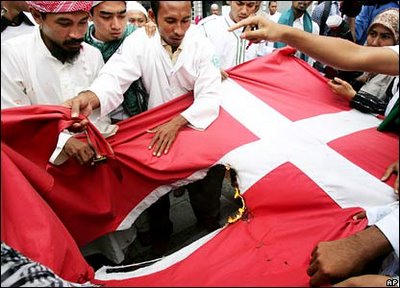Freedom of speech: just how far does it go?

That the acquittal of Nick Griffin came on the same day as the furore over the cartoons of Muhammad reached fever pitch is something of a coincedence, but not necessarily a bad one. Both issues raise the question of how far free speech can and should be taken.
To begin with, Nick Griffin is a racist and a vile one at that. He and his organisation prey upon the weak and naive, using propaganda to recruit those who do not know any better. His claims that Islam is a "wicked and vicious faith" is a crude generalisation that can equally apply to certain parts of any major religion. The southern fundamentalist Baptists in American spring to mind, with their intolerance of homosexuality. How about the extremist Jews who populate the settlements of the West Bank and wish to drive the Arabs out? The chauvinist parties of India have similar low feelings for the Muslims that remain there. His remarks about a local situation that was handled, which involved the apparent grooming of teenage girls was used as a slur against every muslim man in the country. He described asylum seekers, those fleeing persecution and looking for safety as "cockroaches". His completely ridiculous claims that the government puts "their" people above "our" people is a typical polarising tactic used by racists, the us and them syndrome. Yet while I hate his remarks, nothing of which he said should, or did, have breached the law. He did not call for anyone to be attacked or murdered. His remarks were however for the consumption of those who were potential recruits to his cause - of whipping up hysteria and putting one person against another on the basis of their ethnicity or colour of their skin. He should be condemned in the strictest terms, and all his arguments should be deconstructed and showed to be shams - which is what they are. He should not be in prison or banned from public speaking for what he did.
Which brings us to the badly drawn and not generally very good cartoons which were originally published in the Danish newspaper Jyllands-Posten. The main outrage felt by some in the Middle East and in Muslim communities is not only that the prophet Muhammad is not meant to have images made of him (those that exist only generally show his body, his face is usually blank, although a letter in the Grauniad claims that only the Wahhabis and Sunnis generally forbid such images, while the Shia and Sufi are more relaxed about it, which may be why there doesn't seem to have been much protest from and inside Iran.) but also that one of them features a bomb in his turban. The spectre of outrage now seems to reaching levels of anger last seen at the height of the Satanic Verses controversy, but many do also seem to be try to pour water onto the fire, such as the Iraqi cleric Ayatollah Ali Sistani, who has condemned the cartoons but also the militants that have helped give Islam such a bad image.
Jack Straw, probably realising he has a substantial Muslim population in his constituency as well as just speaking as Foreign Secretary, has condemned the newspapers that have republished the cartoons. While they have obviously be acting in solidarity, and the images are now freely available on the internet, it still wasn't really warranted and enflames the situation. It makes those from the outside world think that Europe as a whole has a problem, and no doubt extremists on both sides will be delighted with what has happened.
Free speech as a whole should be an absolute. The day that it becomes a crime to cause offence to someone for whatever reason will be the day that I go jump in the river. Despite their passionate beliefs, do those protesting about the way Muhammad has been pictured really think that he would have cared or that he could stand up to such criticism? It's very similar to those Christians who campaigned against Jerry Springer the Opera - if God existed he would no doubt just view the whole thing as being extremely stupid and quite possibly a bit of fun. If someone with so much power cannot handle being made fun of, why should those who worship him do so, or resort to defending his honour so fiercely when they don't know what his actual view is? It's also worth considering the disgraceful anti-semitism which appears in many state-run Arab newspapers, and even in some school textbooks. Denmark also has to face up to the fact one of the parties of government is virulently anti-immigrant, and that its society has become segregated. It is far from blameless in this issue.
Anti-fascists and liberals are therefore stuck in a quandary. Doubtless we disapprove of the cartoons that are caricatures of only the most extreme members of society. We should respect that Muslims feel that the drawings are threatening, and insult their prophet. However, that doesn't mean that we should apologise or give in to such censorship. What we should be doing is trying to defuse the situation - pointing to human solidarity against those on both sides who wish to harm the majority. Unless we can get past religions and ethnicity, mutual hatred and fear, then we are doomed to repeat the injustices of empire and the brutality of fascism over and over again.
Post a Comment